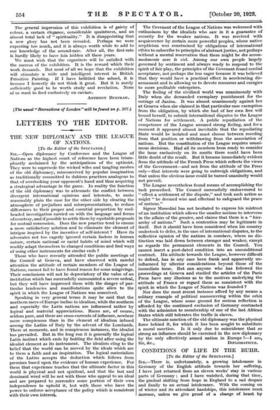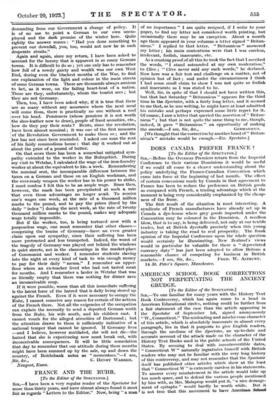CONDITIONS OF LIFE IN THE RUHR. [To the Editor of
the SPECTATOR.] Sin,—There is, unfortunately, a growing intolerance in Germany of the English attitude towards her suffering. I have just returned from an eleven weeks' stay in various parts of Germany ; and I have watched, during that time, the gradual shifting from hope in England to a sad despair and finally to an actual intolerance. With the coming on of winter and its attendant hardships, this intolerance must increase, unless we give proof of a change of heart by demanding from our Government a change of policy. It is of no use to point a German to our own unem-
ployed and the dark promise of the winter here. Quito rightly the answer comes : " Had you done something to prevent our downfall, you, too, would not now be in such desperate straits."
Again and again, since my return, I have been asked to account for the luxury that is apparent in so many German towns. It is difficult to do so ; yet one only has to remember how full of a rowdy gaiety and wealth was our own West End, during even the blackest months of the War, to find one explanation of the light and colour in the main streets of some German towns. There are thousands always anxious to bet, as it were, on the failing heart-beat of a nation. _Those are they, unfortunately, whom the tourist sees ; but they are not Germany.
Then, too, I have been asked why, if it is true that there are so many without any assurance where the next meal will come from, there is practically no one without a roof over his head. Pensioners (whose pensions it is not worth the shoe-leather now to draw), people of fixed annuities, etc., !how do they pay their rents ? Rents, since the revolution, have been almost nominal ; it was one of the first measures of the Revolution Government to make them so ; and the 'Jaw has not since been rescinded. I asked one man the rent of his fairly commodious house : that day it worked out at about the price of a pound of butter.
On that score there has been a somewhat mitigated sym- pathy extended to the worker in the Ruhrgebiet. During my visit to Wetzlar, I calculated the wage of the iron-foundry worker at about the equivalent to 24s. a week. Remembering the nominal rent, the incomparable difference between the taxes on a German and those on an English workman, and the ever-ready weapon the worker has in his power to strike, I must confess I felt this to be an ample wage. Since then, however, the mark has been precipitated at such a rate that even those advantages no longer avail. To receive one's wages one week, at the rate of a thousand million marks to the pound, and to pay the prices (fixed by the daily " index ") during the next week, at the rate of twenty thousand million marks to the pound, makes any adequate swage totally impossible.
But if the worker, too, is being tortured now with a purposeless wage, one must remember that other classes— comprising the brains of Germany—have an even greater claim upon our sympathy, since their suffering has been more protracted and less trumpeted. Indeed, the worst of the tragedy of Germany was played out behind the windows In quiet streets, not in the clamourings in the market-place of Communist and worker. I remember students slaving into the night at every kind of task to win enough money to pay for their daily " mensa." I remember an upper- floor where an ex-teacher lived who had not tasted meat for months. And I remember a larder in Wetzlar that was so literally empty that there was nothing for dinner save an inconceivable soup.
If it were possible, worse than all this immediate suffering is the latent force of the hatred that is daily being stored up against the French. Even if it were necessary to occupy the Ruhr, I cannot conceive any reason for certain of the actions of the French there. Not all the exigencies of the occupation can explain the necessity to send a deported German north from the Ruhr, his wife south, and his children east. I cannot vouch for the alleged atrocities of Dortmund ; but the attention drawn to them is sufficiently indicative of a national temper that cannot be ignored. If Germany lives —and I believe, however mutilated, she will not die—the hatred that she is experiencing now must break out, with inconceivable consequences. It will be little consolation that day to remember that our attitude during these months might have been summed up by the sale, up and down the country, of Reichsbank notes as " mementoes."—I am,











































 Previous page
Previous page